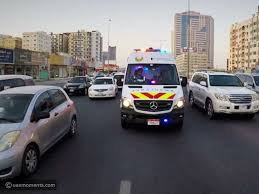Dubai:Delays can be deadly. Authorities in Sharjah are sounding the alarm over a dangerous habit putting lives at risk — blocking emergency vehicles from reaching accident scenes on time.Brigadier Ahmed Haji Al Serkal, director general of the General Department of Prevention and Community Protection, told Khaleej Times: “Too many motorists are still failing to give way to emergency vehicles, a critical mistake that often delays rescue operations in cases of fires, drownings, and road accidents.”
“Every second counts in emergencies,” he underscored, explaining: “People’s lives depend on how fast our rescue teams can reach them. Delays can mean the difference between life and death.”Statistics from the Ministry of Interior revealed that in 2024, a total of 325 accidents across the UAE were caused by failure to give way to emergency vehicles. The highest number occurred in Dubai (160), followed by Abu Dhabi (107), Ajman (31), Sharjah (17), Ras Al Khaimah (5), Umm Al Quwain (3), and Fujairah (2).
Sharjah Police have reiterated their commitment to road safety, calling on all drivers to become responsible partners in their mission. “When you see an ambulance or a fire truck with sirens on, move aside. Don’t hesitate,” Al Serkal urged. “Help us help others; it’s a shared responsibility.”Colonel Sami Al Naqbi, director general of Sharjah Civil Defence Authority, added: “Yielding to emergency vehicles is not just a rule; it’s a moral duty.”He explained that if an emergency vehicle approaches from behind at a red signal, motorists should carefully move forward into the pedestrian area without crossing the red light.
“This simple action can save lives. It’s about compassion and civic sense. Every driver has a role to play,” he pointed out.
Al Naqbi stressed that respecting this rule not only enhances public safety but also supports the UAE’s national goals in reducing traffic-related deaths.
Dh3,000 fine, 30 days vehicle impoundment
Motorists who fail to yield to emergency vehicles face serious legal consequences, including a Dh3,000 fine, six black points, and vehicle impoundment for 30 days.
Authorities stress these penalties apply regardless of where the emergency vehicle is approaching from – whether behind, beside, or from another lane, underscoring the need for heightened awareness and a quick response.
In more critical scenarios, such as natural disasters, emergencies, or severe weather events, the law comes down even harder. Drivers who obstruct rescue efforts in these situations can be fined additional Dh1,000, four more black points, and have their vehicle impounded for 60 days, a clear message that interfering with emergency services is both dangerous and unacceptable.
































